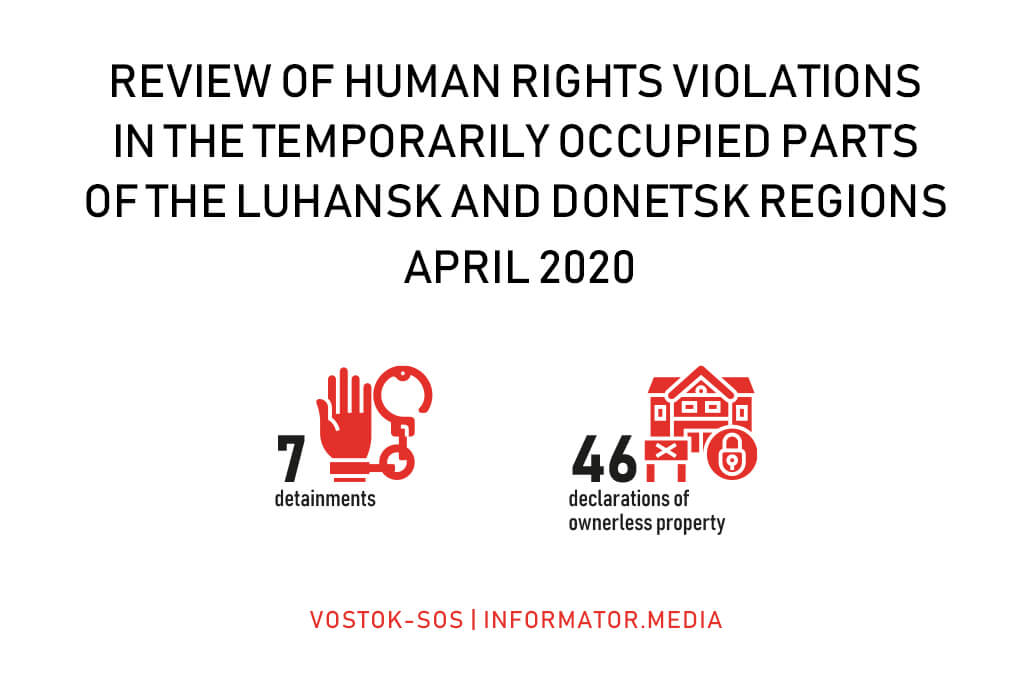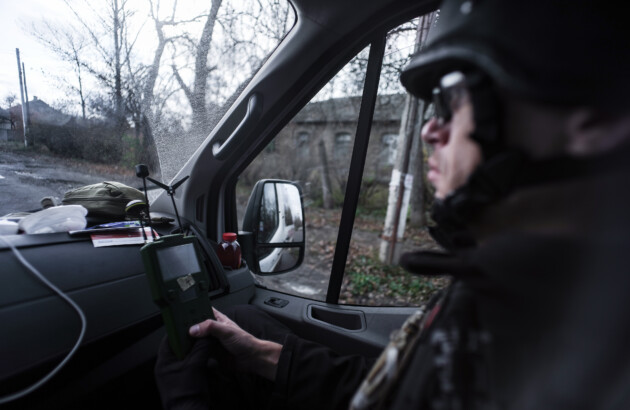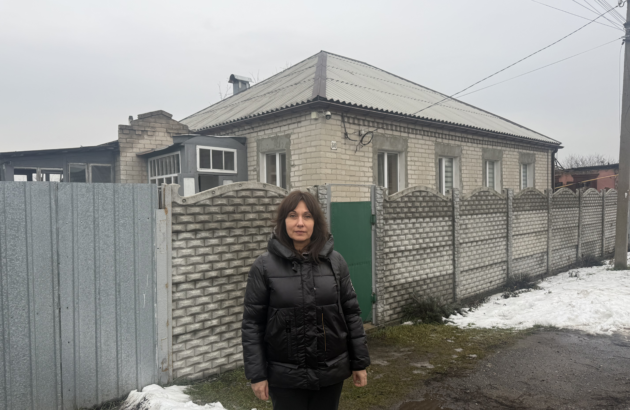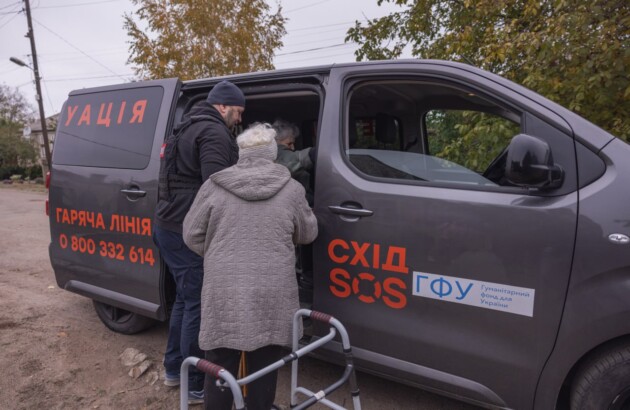Review of Human Rights Violations in the Temporarily Occupied Parts of the Donetsk and Luhansk Regions| April 2020

In April 2020, new human rights violations were detected in the occupied Luhansk and Donetsk regions under control by the occupation administration of the Russian Federation. These include illegal detentions and restrictions of the free movement of citizens, the creation of a parallel legal system, and violations of property rights. Unfortunately, all such human rights violations have become the “norm” for residents of the so-called “people’s republics” territories.
Illegal arrests, detentions and restrictions on freedom of movement
The so-called “Supreme Court of the Donetsk People’s Republic (DPR)” sentenced a resident of Makiyivka to 13 years of imprisonment for alleged “espionage”
The court reports that citizen L. supposedly collaborated with the Security Service of Ukraine (SBU) from September 2017 to February 2019.
The “Ministry of State Security (MGB) of the DPR” also accuses L. of participation in a “terrorist community”, which aims to “forcefully seize power, conduct terrorist attacks, sabotage and murder”.
It is also reported that an explosive device was found during a search, which L. supposedly transported into the occupied territories himself.
The sentence dates from the beginning of April and L. was given a month to “appeal”.
On 16 April 2020, an exchange of detained individuals took place between Ukraine and the temporary occupied territories of the Donetsk and Luhansk regions. As a result, 20 persons returned to Ukraine from the non-government controlled territories.
Citizens released from detainment on the territory of the temporarily occupied parts of the Donetsk region:
1. Alakoz, Oleksandr (civilian)
2. Hrynenko, Mykola (soldier)
3. Iliukhin, Mykola (civilian)
4. Karas, Volodymyr (law enforcement officer)
5. Kostev, Yevhen (civilian)
6. Pomeliayko, Oleksandr (civilian)
7. Sadovsky, Oleksandr (civilian)
8. Siryk, Vadym (civilian)
9. Shaydov, Viktor (soldier)
Citizens released from detainment on the territory of the temporarily occupied parts of the Luhansk region:
1. Zheldak, Vitaliy (civilian)
2. Myronych, Serhiy (civilian)
3. Mozhayev, Valentyn (civilian)
4. Polozov, Mykola (civilian)
5. Popova, Alevtyna (civilian)
6. Rusynov, Serhiy (civilian)
7. Slyvka, Ivan (civilian)
8. Slyvka, Oleksandr (civilian)
9. Tabachny, Oleksandr (civilian)
10. Shtyl, Oleksandr (civilian)
11. Yakovenko, Oleksandr (civilian)
Photo report from Novosti Donbass
Maryna Anatoliyivna Yurchak, born in in 1979, was sentenced to 15 years of imprisonment by the “court” of the so-called “DPR” on 26 March 2020. Before, the woman was included in the list of missing persons on the territory of the so-called “DPR”.
The so-called “Supreme Court of the Luhansk People’s Republic (LPR)” sentenced Serhiy Aramayskovich Petrosyan, resident of the town Alchevsk, to 12 years of imprisonment. The man supposedly collected information for the Security Services of Ukraine (SBU). The respective notice was published on 20 April 2020.
Another resident of Alchevsk, Andriy Volodymyrovych Pimenov, was found “guilty” by the so-called “Supreme Court of the LPR” of espionage for Ukraine and the illegal trade in ammunition and was sentenced to 12.5 years of imprisonment. The respective notice was published on 27 April 2020.
The so-called “Ministry of State Security (MGB) of the DPR” detained Andriy Oleksandrovych Dorozhkin, born in 1985, and Volodymyr Mykhaylovych Shabutsky, born in 1990, on suspicion of “espionage for Ukraine special services”.
On 28 April 2020 a video of the interrogation of Andriy Dorozhkin and Volodymyr Shabutsky was published on YouTube.
The so-called “Prosecutor General of the DPR” states that V.I. Utkin is sentenced to 13 years of imprisonment for “treason and espionage for the SBU”.
The statement also reports that V.I. Utkin was supposedly “involved into tacit collaboration by a foreign intelligence service (SBU)”.
The creation of a parallel legal system, lawyers, notary, and courts
On the temporarily occupied parts of the Donetsk and Luhansk regions, the occupation administrations of the Russian Federation and the mass media channels controlled by them continue to inform local residents and the world community on the activities of their “state bodies”. We stress that these actions are not legally binding and are only aimed at demonstrating the so-called “statehood” of the “republics”.
21 April 2020 the so-called “People’s Council of the LPR” during a plenary session completed the first and second readings and adopted the following laws: “On Amendments to Article 3 of the Law of the Luhansk People’s Republic ‘On the organization of activities of bodies of local government in the transitional period’”; “On Amendments to the Criminal Procedure Code of the Luhansk People’s Republic”; “On Amendments to Chapter 28 of the Labor Code of the Luhansk People’s Republic”; “On Amendments to Article 166 of the Criminal Procedure Code of the Luhansk People’s Republic”; “On Amendments to Article 14:58 of the Administrative Offenses Code of the Luhansk People’s Republic”.
The “Head of the LPR” Leonid Pasichnyk signed a “decree” “On the usage of the name ‘the city of Voroshilovgrad’”.
The “decree” states that the name “the city of Voroshilovgrad” will be used next to the name “the city of Luhansk” during events, dedicated to the memorial dates 9 May, 22 June, and 14 February.
Luhansk was called Voroshilovgrad in two periods during the Soviet Union – from 1935 to 1958 and from 1970 to 1990.
After Pasechnik, Denis Pushilin, “head” of the so-called “DPR”, signed a “decree” that allows the use of the previous name of Donetsk, “the city of Stalino”, in the context of events dedicated to the celebration of Victory Day on 9 May.
Compulsion to join “civil society” organizations and participation in “patriotic” and “social” initiatives in the “LPR” and “DPR”. Involvement of children in propaganda.
On the parts of the Luhansk and Donetsk regions that are temporarily occupied by the Russian Federation, under the heading of “military and patriotic education” anti-Ukrainian propaganda is spread among children, teenagers and youngsters by involving them in “non-governmental organizations”. Employees of state-financed enterprises, on which so-called “external management” has been imposed, do not have the option to refuse participation in the activities of “non-governmental organizations”, since this would lead them to risk serious pressure and prosecution. The respective actions of the representatives of the occupational administrations are violations of the “freedom of association”.
On the website of the “Federation of Labor Unions of the LPR” it is stated that on the eve of the May holidays (including most notably Labor Day, 1 May, and Victory Day, 9 May) “traditionally” community work days will be organized throughout the whole “republic”, notwithstanding the quarantine and the epidemic of the coronavirus COVID-19.
Employees of state-financed enterprises participate in these events.
In Almazny (Krasnyi Luch), Alchevsk, Antratsyt, Bryanka, Holubovske (Kirovsk), Sorokino (Krosnodon), Kadiyivka (Stakhanov), Luhansk, Lutuhine, Pervomaisk, Perevalsk, and Slovyanoserbsk representatives of the “Federation of Labor Unions of the LPR” prior to 1 May laid flowers to statues to the working people, “in honor of Spring and Labor Day”.
The “Speaker of Parliament” Denis Myroshnychenko on the eve of 1 May awarded distinctions to representatives of labor collectives of the so-called “LPR”.
In light of the “project” “Molodaya Gvardiya” (‘Young Troops’) activists of the Bryankovskyi territorial unit of the so-called civil movement “Mir Luhanshine” (‘Peace to the Luhansk region’) in two days distributed more than 200 flyers about the action “Ruka Pomoshi” (‘Hand of Help’).
Violations of property rights
In April 2020, the process of so-called “nationalization” of enterprises continues on the parts of the Luhansk and Donetsk regions that are temporarily occupied by the Russian Federation. These enterprises used to operate under the jurisdiction of Ukraine and are the legal property of citizens of Ukraine, who have been living on parts of the country that are controlled by the government of Ukraine. In our opinion, the facts listed below should be considered violations of property rights. It should be noted that the given violations are part of a systematic and massive effort of illegal expropriation on the occupied parts of the Luhansk and Donetsk regions.
- In April 2020, the so-called “fund of state property of the DPR” published 6 announcements on the renting out of real estate properties without a current owner, as well as notifications that 4 real estate properties were put under governmental control.
- In April 2020, the so-called “state committee of taxes and duties” posted 36 announcements on the discovery of ownerless property in the so-called “LPR”.
Among the announced ownerless property are noted:
- property of legal entities: administrative buildings, non-residential buildings, the memorial complex “to the perished militiamen”, a monument to “the perished inhabitants of the town”, a memorial sign “to the militiamen that perished in battle for the Luhansk People’s Republic in 2014”, a memorial sign “to soldiers and peaceful citizens who died for the liberation of the Donbas in the period of military aggression from 2014 to 2016”, metal household materials, an electricity transformation station, a mine launch unit, a summer trading stall, equipment for a pumping station, centrifugal surface pumps, safes, base stations, mobile network equipment;
- individual property: a fire extinguisher, cash, cars.
Obstruction of the activities of international organizations
On 28 and 29 April, members of armed groups again blocked the entrance to the OSCE Special Monitoring Mission into the non-government controlled areas through official check-points: twice in the Donetsk region and once in the Luhansk region. This is stated in a report from the mission.
COVID-19 in the temporarily occupied Donetsk and Luhansk regions
In the so-called “DPR” at 10:00 on 30 April 2020, 100 cases of infection with COVID-19 have been confirmed. 86 patients are undergoing treatment, 11 have recovered, and 3 patients have died, according to the so-called “Ministry of Health Care”.
In the so-called “LPR” medics registered 129 cases of infection with COVID-19, of which 12 have recovered and were released from the hospital.
“The regional numbers of COVID-19 patients are as follows: 49 in Pervomaisk, 21 in Kadiyivka (Stakhanov), 15 in Dovzhansk (Sverdlovsk), 17 in Luhansk, 8 in Alchevsk, 2 in Brianka, 3 in Perevalsk”.
The Eastern Human Rights Group believes that the so-called “LPR” is covering up the truth on the real number of infections.
The chief sanitary doctor of the “LPR” Dmitro Dokashenko states: “There are tests in our Republic, we receive them as humanitarian aid from the Russian Federation”.
Later, “the Minister of Health Care of the LPR” Nataliya Pashenko said “We of course receive the test systems just like other subjects of the Russian Federation, they are distributed. Practically every week, depending on how rapidly we use the tests, we renew our demands and receive new tests [from Russia]”.
on 3 April 2020, in Khrustalnyi (formerly Krasnyi Luch) the so-called “law enforcement” arrested an entrepreneur for 10 days. The man refused to close his bar/store during the quarantine and displayed “disobedience towards law enforcement officers”, according to the “Ministry of Interior of the LPR”.
The so-called “LPR” has increased the punishment for violation of the quarantine. This decision was taken on 10 April by deputies of the “People’s Council of the LPR”.
The “deputies” passed a series of amendments to the criminal law and the legislature on administrative offenses.
Currently in the so-called “LPR”, sanctions in part 1, article 291 on the “Violation of Sanitary and Epidemiologic Rules” of the “Criminal Code” have tripled the fine.
An amendment was also made to the respective article, which accounts for the “liability for the unauthorized departure from mandatory hospitalization by a person who is under treatment for an infectious disease.”
Moreover, article 130 has been added to the “Criminal Code”. The article institutes a fine on the “conscious endangerment of another individual to be infected with an infectious disease that forms a threat to other individuals in times of the quarantine”. The fine is up to 30 times of the minimal wage or the salary of the convict for a period up to 18 months, or imprisonment for a period of maximum one year.” Accordingly, the fine can be up to 182 thousand rubles (67 thousand hryvnia at the current exchange rate).
In case the refusal to adhere to mandatory hospitalization with an infectious disease that is dangerous to other individuals inflicts serious harm, the suspect risks imprisonment during the quarantine for five to seven years.
Apart from that, the “LPR” increases the fine for legal entities that violate “legislature on accommodation of the sanitary-epidemiological safety of the population”.
Additionally, liability was introduced in the “Parliament” for people who are possibly infected in the following cases: Refusal of mandatory hospitalization/ temporary isolation; unauthorized departure from a place of temporary isolation; the presentation of false information or the refusal to provide information, which is necessary for taking quarantine measures. These cases are met with an alternative measure of punishment “in the form of an administrative fine or administrative arrest”.
In the so-called “LPR” Cossacks set up an operational headquarters, which should supposedly fight the spread of COVID-19. “The main goal of our meeting is to establish a Cossack operational headquarters for the consolidation and fast decision-making to assist local authorities of cities and regions”.
Earlier, “SMI LNR” (‘Mass Media of the LPR’) reported that in Antratsyt and Khrustalny, Rovenky, Dolzhansky, Holubovske and Sorokino, “Cossack Druzhini” (Cossack guards) appeared, patrolling cities together with employees of the “Ministry of Interior of the LPR”.
A review of human rights violations in the temporarily occupied parts of the Luhansk and Donetsk regions is carried out with the aim of preserving democratic rights and freedoms on the territory of Ukraine.
Download the report as a pdf file in English >>>
Download the report as a pdf file in Ukrainian
Informator.media


